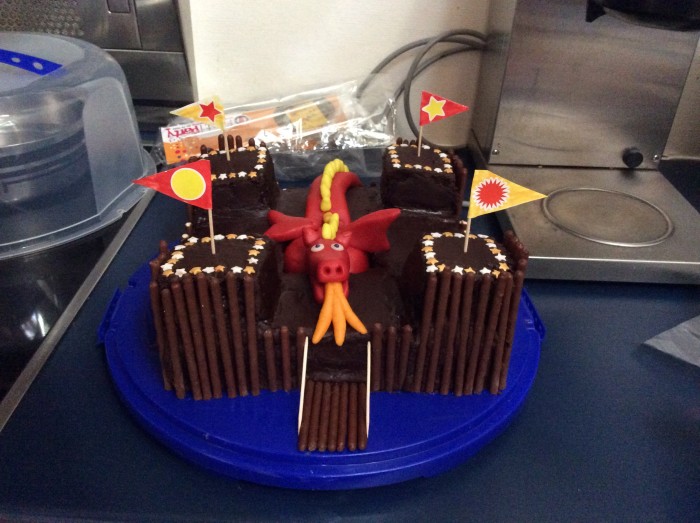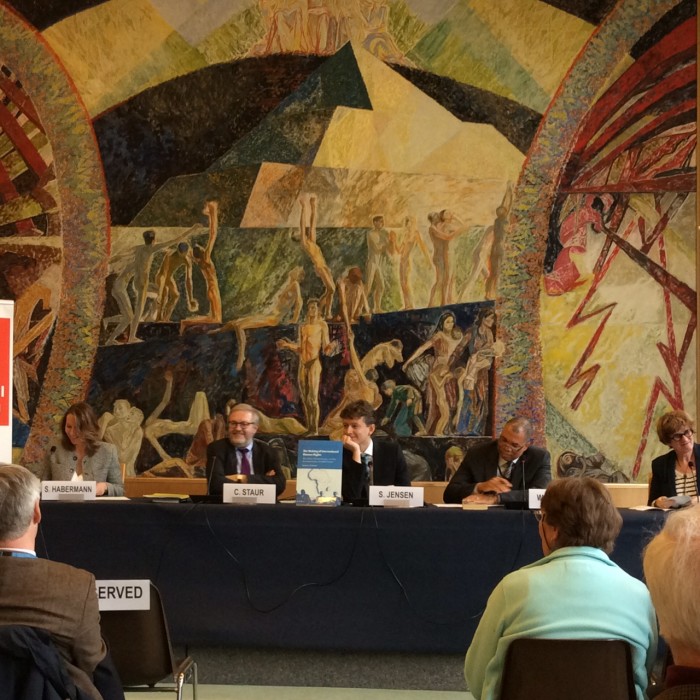21st March 2016 Geneva, Switzerland
Dungeons and Dragons

Sorry for last week’s silence. A bout of family flu and some absent colleagues kept me busier than usual but thankfully everyone’s fine again.
The middle two weeks of the Council session have been typically frantic with everyone trying to work out the version of their resolutions to table which they hope will attract the broadest support. But the way we go about our work really isn’t conducive to building agreeable delegates and I’m more convinced than ever that we need some fundamental changes to our working environment. To begin with I’d recommend introducing a couple of missing essentials – daylight and food.
A pseudo-scientific study last year based on cave explorers found that “really weird stuff happens when human are left alone in the dark”. To summarise it seems that without sunlight we lose perception of time and get bad tempered. So sitting for weeks on end in the UN’s underground windowless, dungeons really can’t be conducive to compromise on globally important human rights issues.
As for the food, eating at the UN ought to represent the pinnacle of culinary sophistication, with an array of global delicacies on offer to sustain body and soul through weeks of hard graft. Sadly there are three lunch options during the Council. You can eat 1) slowly, 2) badly or 3) not at all. I’ve extolled the virtues of the pasta bar before but the queue takes forever and I haven’t had time to eat there for nearly two years. The quick and bad sandwich option brings such darkness to my soul that I physically can’t bring myself to order one anymore. Which leaves cantankerous hunger as my regular Council lunch option followed by high sugar binge eating at 5pm, prompting me to go berserk just when I need to calmly negotiate some final words to a resolution.
Among the many talking points in weeks 2 and 3 was the debate on High Commissioner Zeid’s report. His address to the Council has now become the focal point of each session, with all states anxious to hear whether we’ve been singled out for praise, encouragement or criticism. During the ensuing debate the United States delivered a joint statement on the situation in China, who Zeid had spoken about in critical terms in February. The US statement highlighted China’s deteriorating human rights record, especially the arrests and ongoing detention of rights activists, civil society leaders, and lawyers. It also drew attention to recent disappearances and apparent coerced returns of Chinese and foreign citizens from outside mainland China including Hong Kong Bookseller Lee Po, whose case Zeid had highlighted.
During the Council’s later debate on country situations, North Korea took the decision to absent itself in protest at the Council’s ongoing criticism of its record. North Korea has long been on UN’s human rights agenda, but has always steadfastly refused to engage or seek to improve its record. Given its truly horrific human rights situation North Korea would do much better to accept outside scrutiny and request external help, rather than to boycott. This session the EU and Japan are seeking to establish a new group of experts on accountability in North Korea to recommend practical ways of achieving truth and justice for victims of crimes against humanity in the country.
The UK was among a group of four countries that tabled a resolution last week in response to the Council’s report on South Sudan. The report details the most horrific violations I have read in recent years. Among the atrocities documented are government forces committing massive scale rape against civilians as weapon of warfare and a government policy of allowing armed groups to rape women in replacement for wages. It describes civilians being burnt alive, starved, and many other appalling crimes against

children. There can be no doubt that South Sudan deserves the Council’s strongest condemnation and warrants the new mechanism to monitor human rights in the country that the tabled draft proposes.
When states at the Council try to justify their refusal to support country resolutions they often claim that human rights are a western agenda and that singling out individual countries is a tool used by the developed world to pick on those less developed. This is simply not true and an excellent new book launched at the UN last week on ‘The Making of International Human Rights’ by Danish author Steven Jensen sets the record straight. His work demonstrates how countries like Jamaica, Liberia, Ghana, and the Philippines were at the human rights forefront in the 1960s and transformed the norms upon which the modern international human rights system is built. While western states were historically reluctant to criticise others, it was those form the global south who led the way in shaping human rights as we now know them and using them a tool of international pressure. I hope a good number of my Council colleagues will get the chance to read the book.
I wish you a good final week of the Council. On the home front, now that everyone is back to health, we’ve managed to celebrate my son’s 5th birthday. A colleague of mine who also has young children has asked how I explain the Council’s work to children of his age. It’s got me thinking and I hope to share my thoughts next week but in the meantime my son thought you might like to virtually share his birthday cake. I am not sure if all this talk of dungeons and getting grumpy when I’m hungry inspired my wife when designing the cake. But at least the dragon looks friendly.

Great post, bonus points for the d&d reference!